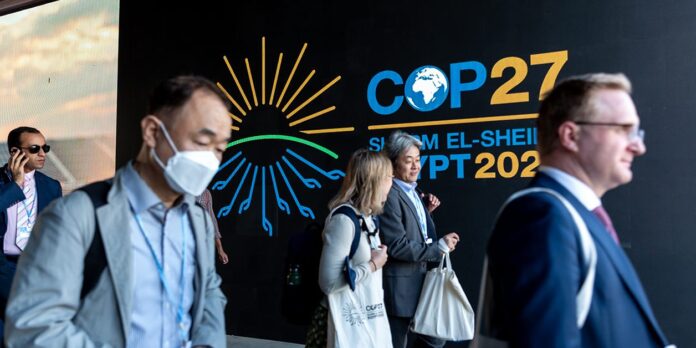Events promise to be stormy in Sharm el-Sheikh, from November 6th to 18th. It must be said that Africans are upset, even angry, at what they see as a form of hypocrisy on the part of industrialized countries. This was perfectly illustrated in September by the failure of the Rotterdam summit.
This conference, an initiative of Africans on the 26thIt is The Conference of the Parties (COP26) allowed the contribution of 25 billion dollars to finance adaptation to climate change on the continent. A real fiasco, it ended with the promise of a ridiculous envelope of… 55 million dollars.
“[…] 55 million for 54 countries”, said Nana Akufo-Addo, then visiting Paris, a few weeks later. “It’s not fair, it’s not fair. Applying the principle of equity is not giving, it is refusing to take an advantage that does not belong to you. It has nothing to do with charity”, he insisted.
frustration
The tone is set. In the Netherlands, where the president of Ghana represented the continent alongside Macky Sall and Felix Tshisekedi, not only did the commitment of Western leaders (politicians and industrialists) not meet expectations, but above all the latter did not deign to attend this meeting to which they were invited. “It leaves a bitter taste in our mouths”, the Senegalese head of state and current president of the African Union (AU) did not fail to point out. Adding to the large European industrial groups: “They are the main polluters of this planet, they are the ones who must finance these changes. »
Whether in August in Libreville during African Climate Week, or in early October in Kinshasa on the occasion of pre-COP, across almost the entire continent, as this COP27 approaches, one and the same feeling dominates: “frustration” , breathes Tanguy Gahouma -Bekale, who was chief negotiator of the Africa group at COP26.
“In Glasgow, he explains, Africans accept many things. They signed the final agreement, although not prior to, for example, any funding mechanism for “losses and damages” related damage caused by climate disasters. The Gabonese, now an advisor to President Ali Bongo Ondimba, continues: “In return, the commitment made by rich countries [in 2009] to mobilize 100 billion dollars per year [between 2020 and 2025] to help developing economies fight against the global warming must finally be achieved from COP27 onwards. A few weeks before the event, it looks like I won't be there. »
1.6 trillion dollars needed
Meanwhile, the needs of developing countries continue to grow. African economies are now estimated to need between 1,300 and 1,600 million dollars to achieve, in 2030, the objectives of the Paris agreement. For the continent's representatives, it is no longer a question of continuing to draw up endless lists of findings and promises. That their economies have the least influence on greenhouse gas emissions is a fact. That they are also the most considered and hardest hit by droughts, floods and the like is also well known.
Finally, it is indisputable that the continent is the one that best offers solutions to the planet due to its forest cover – that of the Congo Basin, in Central Africa, is the second largest in the world –, its important photovoltaic resources, minerals and hydraulic resources.
Only one urgent question matters now: when industrialized countries, in particular those in the G20, are responsible for 80% of greenhouse gas emissions, will they finally find substantial financial solutions to address these issues? Pascal Lamy, former director general of the World Trade Organization (WTO) and now member of the board of directors of the Mo Ibrahim Foundation, believes that the World Bank (WB) also has an important responsibility to assume. “It is an institution designed to combat poverty. But it is dragging its feet in tackling the climate problem that generates poverty in Africa”, he accuses.
As Ève Bazaïba, Minister of the Environment of the DRC, sums it up well: African countries, including yours, are finding it increasingly difficult to choose between fighting “extreme poverty” and financing the “heavy bill to pay for adaptation to climate change.” As a result, his country recently decided to launch oil prospecting and exploration operations in part of its forests and peatlands.
Hydrocarbons for domestic use
In effect, in the famous coastal city of Sinai, it is therefore a matter of negotiating financing (subsidies and long-term investments) to help African economies adapt their development strategies to climate change. The energy transition will also be at the center of the debates, an issue that is particularly at the center of oil and gas producing countries. Who believes that regardless of the values released for adaptation, this transition must be “fair and balanced”.

In other words, that African economies must continue, contrary to the decisions taken at the last COP to reduce credits and financing for fossil fuels, to explore the latter to support their development. This position was expressed above all by Macky Sall in June: “It is inconceivable that those who have been exploiting oil, coal and fuel oil for more than a century are preventing African countries from developing their resources. »
Nigeria's vice president, Yemi Osinbajo, says no more. At the launch this year of his country's energy transition plan, the cost of which is estimated at US$410 million, he said: “For Africa, the problem of energy poverty is as important as our climate ambitions. Energy use is crucial to almost every conceivable aspect of development. Wealth, health, nutrition, water, infrastructure, education and life expectancy are closely linked to per capita energy consumption. »
Macky Sall and Yemi Osinbajo's vision was somewhat applauded by the International Energy Agency (IEA) when it stated that African countries that use fossil fuels in the short term – for domestic use rather than export – have little impact on global emissions. Only for home use? "That's it It is up to Africans to decide whether they are mining for themselves or whether they want to export”, responds Pascal Lamy. “They have enough capacity to export and consume locally to produce energy, fertilizers or desalinate seawater. Demographic growth and the high level of needs”, adds the French economist.
Green finance and knowledge sharing
There remains the issue of financing oil and gas projects. Because today, multilateral institutions, private banks, protégés or investors of all types, constrained by ESG regulations, are reluctant, as we can see in Uganda, to support the development of oil fields. In this regard, the European Investment Bank (EIB) recently stood out for the particularly categorical position of its President, Werner Hoyer, who, according to Financial Times, intends to end the financing of gas production, still considered, along with nuclear energy, as a transition energy by the European Union (EU), the institution on which it depends. “These are positions that penalize Africans above all, because evolved economies have the means to do without this type of institution. »
But on the continent there are also many voices that defend a model based on the promotion of renewable energy. Among them, Evans Osano, director of capital markets at FSD Africa, specializing in green finance. He said the continent does not have the same energy infrastructure as the West, so it can avoid a phase of fossil fuel development and establish a new order now.
He believes that the application of good practices in productive sectors such as agriculture, water, energy and mineral resources – the main drivers of economic growth on the continent – can help guide countries towards renewable energy, generating jobs and developing a “manufacturing industry”. green places”. According to this Kenyan financier, it could be an opportunity for African countries to rebalance the balance of power between North and South, by doing things right from the beginning, or learning lessons from the West's mistakes.
Director General of the Global Center on Adaptation, an international organization that acts as an intermediary in the implementation of climate adaptation solutions, Patrick Verkooijen believes that the only way to stop the climate emergency is “to guarantee that the money that circulates in Africa. And this flow needs to happen in real time, argue.
Money is not enough, says Mahmoud Mohieldin, the UN's top climate change advocate in Egypt. And to specify young Africa “It’s also about technical knowledge, knowledge sharing [et] progress in research and development. Today, we are more comfortable talking about renewable energy sources, as there has been a huge cost reduction of almost 95%, especially in the case of solar energy in the last ten years. »
Growth of renewable energy
Despite the reluctance of many companies to invest in power projects in Africa, claiming the risks are greater than elsewhere, it is clear that renewable energy capacity in Africa has increased by more than 24 gigawatts (GW) since 2013. And big This growth has been driven by solar and wind projects in North and East Africa, especially in Egypt, Algeria, Tunisia, Morocco and Ethiopia.
Some other examples are emerging in other parts of the continent. In Senegal, for example, photovoltaic technology has allowed the country to build its cheapest energy source. Similarly, South Africa is currently making what will be its largest investment in renewable energy: its 100 MW Redstone Concentrated Solar Power Project. And in Kenya, the Lake Turkana wind project produces 310 MW, enough to power more than a million homes.
Even if Africa pursues all its environmental adaptation projects, this will not protect it from the climate change spiral caused by the West's inability to achieve its own goals. According to Mahmoud Mohieldin, pressure is increasing so that COP27 is not just another conference of “promises and commitments useless".

